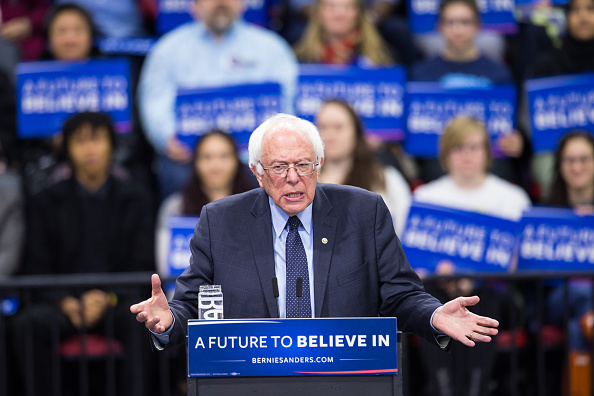
Bernie Sanders doesn’t want to talk about the middle class right now. He wants to talk about the poor.
The Vermont Senator on Tuesday made some of the most extended remarks on poverty of his campaign, telling an audience in Poughkeepsie, N.Y., that there is “a physiology of poverty” and tying his own ambitions for helping the poor to the legacy of President Franklin D. Roosevelt.
“There have been a number of studies that have come out recently which have shown that low-income people have a life expectancy significantly lower than wealthy people. In other words, poverty is a death sentence,” Sanders told an audience at Marist College in the Hudson Valley.
“There is a physiology of poverty — that means when you wake up in the morning, you don’t know how you’re going to feed the kids, how you’re going to get access to health care. That stress alone wrecks havoc on your body,” Sanders continued.
Read More: Why Flint’s Life Expectancy Is Below the National Average
Fighting poverty has occasionally been at the forefront of Democratic politics. President Lyndon Johnson declared a War on Poverty in 1964, New York Senator Robert Kennedy ran for President on the issue in 1968, and North Carolina Senator John Edwards made it a centerpiece of his national campaign in 2008. But in recent years, many Democratic candidates have chosen to blur the lines between the impoverished and middle-class Americans.
Sanders has often discussed the poor on the campaign trail before, and Americans who live “paycheck to paycheck.” But he normally uses the term “working people,” while his opponent, former Secretary of State Hillary Clinton addresses “everyday Americans.”
But with slim chances of winning the nomination, Sanders embraced the problems of the poor in his speech in the key state of New York on Tuesday, aiming to increase attention to an issue he believes the Democratic Party should have paid more attention to over the past two decades.
“A great nation is judged not by how many millionaires and billionaires it has, but by how it treats the weakest and most vulnerable amongst us,” Sanders said.
Sanders has proposed huge levels of spending for program proposals from single-payer health care to massive jobs and infrastructure programs that are unprecedented in contemporary major-party American political platforms. But he’s also faced criticism from some Democrats, especially rival Clinton, that his plans aren’t achievable.
Following a visit to the Franklin D. Roosevelt home in the Hudson River Valley, Sanders sought to refute that argument by extensively citing the Depression-era President.
“Before [Roosevelt] becoming President, the general culture was, ‘It’s too bad that people sleep on the street, or that people are hungry or people die because they do not have access to health care, but it is not the government’s responsibility,’” Sanders said.
Roosevelt “came forward and he said, You know what? We’re going to transform the way government works in America,” Sanders continued. “Roosevelt was right back in 1944, and we still have not achieved that goal.”
Read More: The Possible Presidential Candidate Who Agrees the Most With Pope Francis
There is a political upside to be gained for Sanders in tying himself to Roosevelt. Sanders faces a difficult New York primary on April 19 and could benefit from his association with a local New York hero. Earlier on Tuesday at Roosevelt’s historic home, Sanders called the 32nd President “one of the greatest Presidents in the history of our country” and said “there is a lot we can learn from Roosevelt’s life,” according to an aide.
At least among his most ardent supporters, Sanders’ message may resonate.
“Living paycheck to paycheck is poverty,” said Rob Pinto, a member of the Communications of America union who said he is striking against Verizon on Wednesday. “It’s been the best-kept secret for 40 years, and Bernie is telling everybody the biggest secret in America: that poverty is a problem and poverty is real and most people are dealing with it whether they know it or not.”
More Must-Reads from TIME
- Donald Trump Is TIME's 2024 Person of the Year
- Why We Chose Trump as Person of the Year
- Is Intermittent Fasting Good or Bad for You?
- The 100 Must-Read Books of 2024
- The 20 Best Christmas TV Episodes
- Column: If Optimism Feels Ridiculous Now, Try Hope
- The Future of Climate Action Is Trade Policy
- Merle Bombardieri Is Helping People Make the Baby Decision
Contact us at letters@time.com